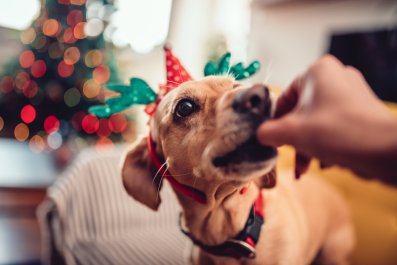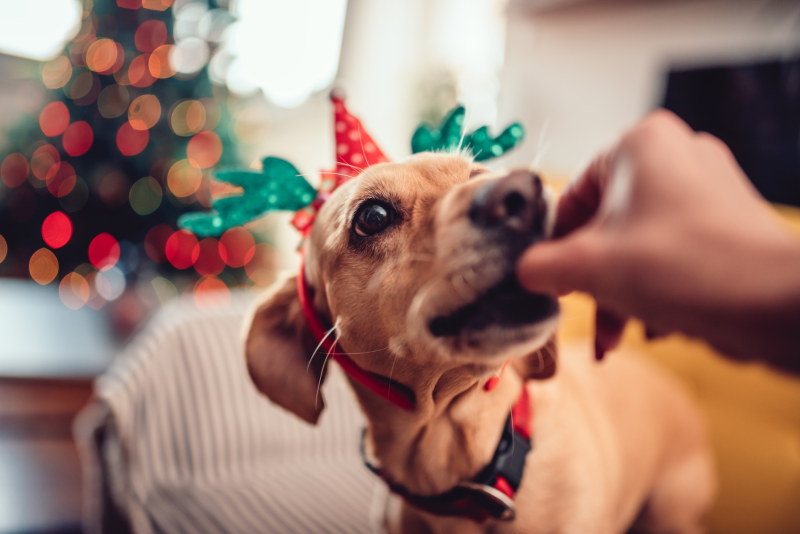
Don't Feed Your Dog These Festive Treats This Christmas
Santa Claus is coming to town—and so, too, is a whole bunch of festive food that may not be safe for dogs.
According to the American Veterinary Medical Association, 45 percent of U.S. households and 89.7 million Americans own dogs. Dogster said there are an additional 13 million in U.K. households.
And a survey by pet insurance company Waggel has found that almost a quarter of dog owners plan to give their furry friends extra treats and food during the festive period. The Waggel survey was conducted among 1,000 dog owners in the United Kingdom in 2024.
The same survey found that 44 percent of dog owners plan to only give them pet-safe treats—but that 79 percent are unsure about which foods are harmful and the potential dangers of getting it wrong.
There are some obvious no-nos. Yule logs, chocolate Christmas candies, hot chocolate and more are off the list for dogs, as chocolate contains theobromine, which is toxic to them.

But other non-chocolate candies and sweet treats might be an issue too. Dog owners should check for sweeteners, because some—such as xylitol—can be very dangerous to dogs, leading to low blood sugar and, potentially, liver failure.
Many traditional sweet treats at Christmas contain dried fruit, such as raisins, sultanas and currants, especially from non-American cultures such as British Christmas pudding or Italian panettone.
But these should be kept away from dogs too, as they can lead to kidney failure and death even in small amounts.
Stuffing is a definite no. Nuts are sometimes okay, but some—especially macadamia nuts—could give your dog tremors, weakness and vomiting.
And stuffing also contains onions, garlic, chives and leeks which, while tasty, are no good for dogs, as they can damage their red blood cells and lead to anemia.
Dogs and alcohol don't mix either; alcohol poisoning can make dogs vomit and lose coordination—and even put them in a coma.
Nor do dogs want coffee. Caffeine can lead to restlessness, rapid breathing and seizures.
Meanwhile, bread dough can expand in canine stomachs, leading to bloating and digestive issues.
Avocado is not found on many Christmas dinner tables, but is also one to avoid, as it can give dogs vomiting and diarrhea.
However, there are some human foods which are safe and even beneficial for dogs.
Junior Hudson, nutrition and behavioral expert at Waggel, said in a statement that he recommended apples (without seeds), blueberries, turkey, salmon (cooked or canned, not smoked) and lamb—as long as they are simply prepared.
There are plenty of vegetables that dogs can enjoy too, such as green beans, brussels sprouts, parsnips, carrots, peas, swede and potato, he said.
"Always ensure these foods are prepared without seasonings, oils or rich additives, as these can upset your dog's stomach," said Hudson. "Keep portions small and treats occasional to avoid disrupting their gastrointestinal system."
If you're worried that your dog may have eaten something that they shouldn't have, take them to a vet, he advised. If they don't seem to have any immediate symptoms, check their poop.
It should be a consistent medium to dark brown color, firm but not hard, log-shaped and free from mucus, blood and undigested food.
"Regular checks can help spot issues quickly, especially after the holidays," said Hudson. "It's an easy way to catch signs of digestive discomfort early and seek veterinary advice if needed."
Do you have a tip on a food story that Newsweek should be covering? Is there a nutrition concern that's worrying you? Let us know via science@newsweek.com. We can ask experts for advice, and your story could be featured in Newsweek.
